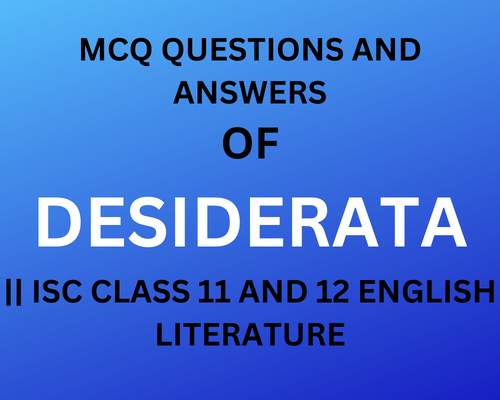
You will go through MCQ QUESTIONS AND ANSWERS OF DESIDERATA || ISC CLASS 11 AND 12 ENGLISH LITERATURE written by Max Ehrmann. Understanding a text’s entirety is very important for a learner to score better on the exam. We made Efforts to ensure thorough and proper MCQ QUESTIONS AND ANSWERS OF DESIDERATA || ISC CLASS 11 AND 12 ENGLISH LITERATURE written by Max Ehrmann
1.Who is the writer of the story?
A) Max Ehrmann
B) W Somerset Maugham
C) Ruskin Bond
D) O. Henry
YOU ARE READING –MCQ QUESTIONS AND ANSWERS OF DESIDERATA || ISC CLASS 11 AND 12 ENGLISH LITERATURE
2.When was the poem written?
A) 1950
B) 1988
C) 1927
D) 1924
3.Which of the following messages can you get from the poem?
A) To never forget old friends
B) To live a happy and hopeful life
C) To fight with the struggles of life
D) To love nature
4.How does the poet portray the concept of ‘age’ in the poem?
A) An ugly truth
B) A teacher
C) Worst enemy
D) A child
[blur]5. How does one deal with the daily chaos according to the poet?
A) One must not be worried and live life happily
B) One should keep ignoring and be in denial
C) One should keep their calm and go placidly
D) One should overthink about the whole scenario
6. What is the meaning of the term ‘aridity’ in the poem?
A) State of being dry or lack of humidity
B) Lack of fresh air
C) Overflowing of water
D) Greenery
7. What is the literal meaning of ‘Desiderata’?
A) Happiness
B) Unwanted things
C) The name of a girl
D) Desired things
8. “But do not distress yourself with dark imaginings”- Identify the figure of speech.
A) Alliteration
B) Anaphora
C) Imagery
D) Simile
9. What is the tone of the poem?
A) Materialistic
B) Scientific
C) Philosophical
D) Satire
10. What is the antonym of the term “placidly” in the poem?
A) Excited
B) Even-tempered
C) Motionless
D) Gruesome
11. What is the opposite of ‘disenchantment’ in the poem?
A) Dissatisfaction
B) Agreement
C) Disagreement
D) Discontent
12. “Take kindly the counsel of the years”- What is the figure of speech?
A) Transferred epithet
B) Anaphora
C) Oxymoron
D) Metonymy
13. According to the poet, what can give rise to most fears?
A) Fatigue and loneliness
B) Ghosts and negative spirits
C) Existential crisis
D) Jealousy and lack of confidence
14. “You are a child of the universe”- What does the poet mean by ‘you’ in the line?
A) A baby
B) Poet’s child
C) Unidentified individual
D) Readers
15. Which of the following advice has the poet not offered in the poem?
A) One should calmly handle chaotic situations
B) One should talk about their ideas and beliefs clearly
C) One should always get defensive and avoid people who are dull
D) One should be humble
16. What does the term ‘drudgery’ mean in the poem?
A) Drugs
B) Dull work
C) Dungeons
D) Exciting tasks
17. “Speak your truth quietly and clearly”- What does the poet mean by ‘truth’ here?
A) Practicality
B) Fact and principles
C) One’s experiences and ideas
D) Sad truth of life
18. “Many fears are born of fatigue and loneliness.”- Identify the poetic device.
A) Anaphora
B) Alliteration
C) Irony
D) Antithesis
19. “Nurture strength of spirit to shield you in sudden misfortune.”- Identify the poetic device.
A) Irony
B) Alliteration
C) Pun
D) Anaphora
20. “It is as perennial as the grass”- Identify the poetic device.
A) Oxymoron
B) Metaphor
C) Simile
D) Irony[/blur]
